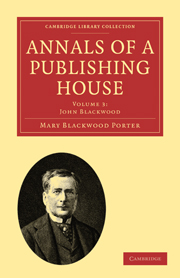Book contents
- Frontmatter
- INTRODUCTION
- Contents
- PLATES
- CHAPTER I EARLY LIFE OF JOHN BLACKWOOD
- CHAPTER II GEORGE ELIOT'S EARLY NOVELS
- CHAPTER III EDINBURGH AND LONDON
- CHAPTER IV A. W. KINGLAKE AND ‘THE INVASION OF THE CRIMEA.’
- CHAPTER V LAURENCE OLIPHANT
- CHAPTER VI THE EDITORIAL SANCTUM
- CHAPTER VII STRATHTYRUM
- CHAPTER VIII CHARLES LEVER
- CHAPTER IX “THE MILITARY STAFF OF BLACKWOOD.”
- CHAPTER X THE EDITOR ABROAD
- CHAPTER XI MRS OLIPHANT AND NEW RECRUITS
- CHAPTER XII GEORGE ELIOT'S LATER WORKS
- CHAPTER XIII LAST YEARS
- INDEX
- Plate section
CHAPTER II - GEORGE ELIOT'S EARLY NOVELS
Published online by Cambridge University Press: 05 November 2011
- Frontmatter
- INTRODUCTION
- Contents
- PLATES
- CHAPTER I EARLY LIFE OF JOHN BLACKWOOD
- CHAPTER II GEORGE ELIOT'S EARLY NOVELS
- CHAPTER III EDINBURGH AND LONDON
- CHAPTER IV A. W. KINGLAKE AND ‘THE INVASION OF THE CRIMEA.’
- CHAPTER V LAURENCE OLIPHANT
- CHAPTER VI THE EDITORIAL SANCTUM
- CHAPTER VII STRATHTYRUM
- CHAPTER VIII CHARLES LEVER
- CHAPTER IX “THE MILITARY STAFF OF BLACKWOOD.”
- CHAPTER X THE EDITOR ABROAD
- CHAPTER XI MRS OLIPHANT AND NEW RECRUITS
- CHAPTER XII GEORGE ELIOT'S LATER WORKS
- CHAPTER XIII LAST YEARS
- INDEX
- Plate section
Summary
The winter of 1856-57 was further memorable by the introduction of a fresh element in the many interests that were crowding into John Blackwood's life. At this time began his correspondence with George Eliot, and her first appearance in the pages of the Magazine with the ‘Scenes of Clerical Life.’ It would be more correct to say the correspondence began with Mr G. H. Lewes, who introduced the unknown author's writings to the Editor without explaining his identity. Lewes himself had been a contributor for many years; his brilliant articles on scientific, social, and other matters were well known to the Editor, who admired the literary ability which enabled him to give a fine edge and brilliancy to the more solid subjects he handled for the Magazine, as well as adding precision and weight to his lighter contributions, making these articles as valuable in their way as the more important works that have distinguished him as an author and man of science. An introduction from him to a new contributor was likely, therefore, to be received with interest, though, as has been shown in the second volume, a certain customary caution was not dispensed with till the series had fairly set sail, and the Editor was able to stamp them with his unqualified approval. Lewes's gay and brilliant letters to him, and the amusing replies they elicited from the busy Editor, form a pleasant feature in the day's work.
- Type
- Chapter
- Information
- Annals of a Publishing House , pp. 37 - 57Publisher: Cambridge University PressPrint publication year: 2010First published in: 1898



